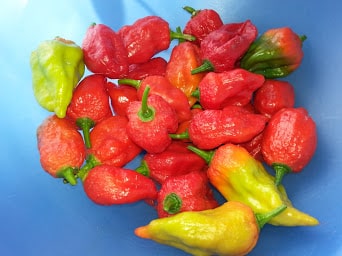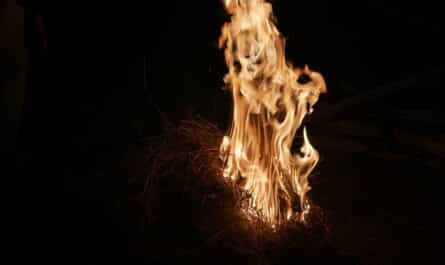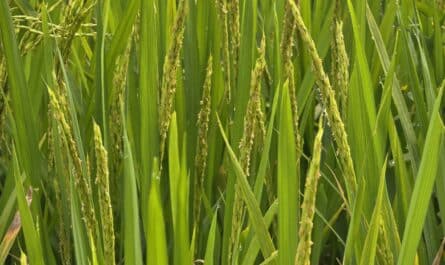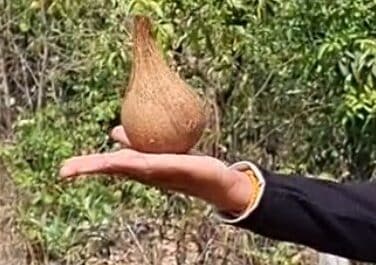After a harrowing few months, we finally had our names on the ‘satbara’ [7/12], and we were eager to start farming. While waiting for the transfer to come through, we had paid a fortune for our Fiend Highway [our access road], cleared the wild undergrowth and scraggly trees and identified two potential points to dig borewells for water.
Interestingly, soon after we purchased the land, our architect friend sighted an Umbar tree (Ficus racemose/cluster fig) on the farm and said we would definitely find water near the tree. He also said we should never cut this tree as it has mystical, mythical, magical properties, and the land where the Umbar tree is cut is considered cursed!! Of course, we weren’t going to cut down the tree. No curses for us, thank you! And yes, one of the places where our water diviner eventually told to drill for water was next to the Umbar tree!
As we cleared the land, we found over 100 wild mango, cashew, guava and jambul (Indian blackberry) trees hidden in the wild thicket. These trees had never been planted or cared for; they had grown wild in the rich red soil, the miracle of mother nature, pollination and seeds being scattered et al. We were pleased as punch with this unexpected farming headstart.
In consultation with M&S (M = man-of-all-parts, S = farm consultant), we made a list of the rice, fruits, vegetables and spices we wanted to plant. I fear we drove them crazy by adding new plants every time they returned from the nursery after placing an order. Mango, cashew, guava, chikoo (sapota), tamarind, banana, neem, drumstick, pepper, rice, we wanted them all. And we were raring to get going.
We had cautiously held off doing any work on the farm except for the clearing till we got our names on the satbara, so we were now racing against time to get everything done before the onset of the monsoon. The rains play a vital role in agriculture for a variety of reasons. For us, it was crucial that the land be prepared for planting before the rains. Also, as the water table is at its lowest just before the monsoon following a long dry summer, it’s the ideal time to drill for water.
While S got to work digging holes for the saplings and constructing a live boundary fence, M spoke to several contractors to get our borewells drilled. We were now in late May, and Cyclone Tauktae had already wreaked its havoc in the Raigad area, causing flash floods, making a moonscape of brand new highways, uprooting trees and leaving large areas without electricity for days on end. Weather reports suggested an early onset of the monsoon, and we urgently needed to get our borewells drilled. But, as luck would have it, all borewell contractors were already busy because everyone wanted to drill before the rains, and no contractor was willing to commit to a firm date. Finally, on the 1st of June, by which time we had chewed up poor M’s ear and bitten our nails to a quick, one contractor deigned to take on our work. But of course, things weren’t as easy as that. When the contractor visited the farm along with M, he declared he couldn’t take on our job as the Fiend Highway was too narrow and uneven, and he couldn’t bring in his giant drilling machine down that road. Many panicky calls followed until M suggested that our neighbour permit us to drive the bore driller through his land. I made a quick call to our obliging neighbour (more on him in another post), and we were all set.
Disaster struck again when the boring truck knocked down a part of the neighbour’s fence and a part of some unidentified concrete structure on his farm. Another flurry of phone calls followed, where we promised to repair and pay for all damage before the truck was allowed to proceed. The borewell drilling went on till late, very late into the night, with M on-site reporting every hour on the hour. Happily, we hit water very quickly at both points. We had heard horror stories of people in the area not reaching water even after digging 700 feet, or worse, hitting rock after a few feet of drilling. The Water Gods had blessed us. Borewells drilled, we locked them up and placed them on the back burner till we could get electricity to run the pumps.
Buoyed with our ability to manage minor problems and increasingly confident that we were well-suited to organic farming, we bought another plot of land. A mere 7 km away from our first farm, but it may as well have been on another planet. Spectacularly beautiful and absolutely remote. No mobile network. No electric poles in the immediate vicinity. No neighbours. And no village in sight. But so so beautiful. We figured we would buy it, fence it, and decide what to do with it in a couple of years. But, you have all heard about the best-laid plans of men and mice….
Meanwhile, S had all the holes dug for and fertilised and was ready to plant the first saplings. He had also prepared the paddy field to sow our rice immediately after the first rains. He was assisted by a young imp from the neighbouring village who we immediately hired as our first full-time employee.
What followed were delightful days of digging, planting and sowing.
All of us lent a hand. We sowed rice, splashed about in our paddy field, ploughed, tried our hand at shovelling and digging and transported saplings from the tempo to the farm.
Family, friends, and even a few strangers joined us in our planting, and we were delighted with the enthusiasm and response. Bandra Rose arranged for a day outing for her nephew and his friends [along with their minder moms], and after a few minutes of complaining about the slush and mud, the kids threw themselves into the whole process and spent many hours ploughing, sowing and digging. They didn’t want to leave when it was time to go and asked if they could stay there till the stars came out.
Seeing the kids working on the land and enjoying every minute of it made the entire farm worth its weight in gold. If you want to get your hands dirty and work with us on the farm, do reach out. We will never say no to free labour😊
Take a step outside your comfort zone and find a different type of comfort. Take risks because you believe in yourself. Overcome odds and persevere because you believe in what you do. And most importantly, don’t lose your connection with the earth.
As Mahatma Gandhi once said, “To forget how to dig the earth and tend the soil is to forget ourselves.”




Super impressive ..planting and sowing your selves ..just wow 👍
Too much fun!! Where do you strike next? looking forward to the next episode.
Thanks, TK. It really is a lot of fun. Stay tuned for the rural round table conference coming up soon
Love your latest blog!
As I was reading it, I could get the smell of mother earths “mitti”.
So happy to read that the kids pitched in and enjoyed themselves. Hands on experience is the best way to learn!
What touched my heart was your quote – ” Take a step outside your comfort zone and find a different type of comfort. Take risks because you believe in yourself. Overcome odds and persevere because you believe in what you do.”
Amen to that!!
Thank you. Can’t wait for you to come and visit the farm
Fabulous! So exciting. Well done. Can’t wait to taste the rice
Harvest hopefully end October/early November. Have sown black rice, so that should be fun. Will definitely send you some
I’m loving the stories.
We would love to lend a hand or two at a proper farm. How can we reach out and possibly come and help out at the farm some day?
Thanks, Parth, Do follow us on @twobandragirls. I will post the next time we need help on the farm with sowing or harvesting.